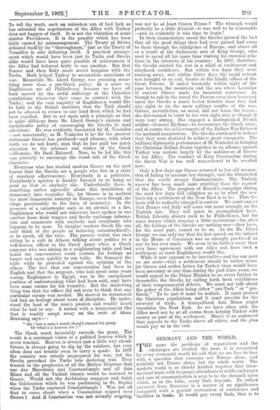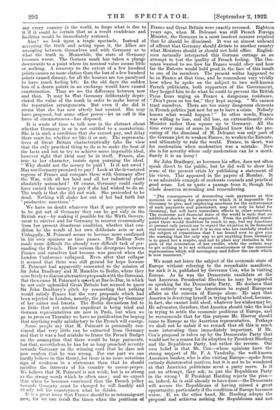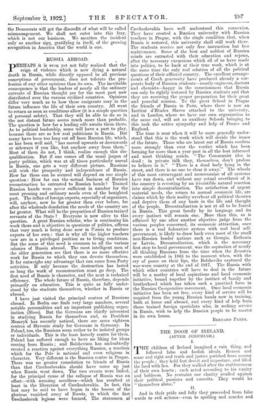GERMANY AND THE WORLD. T HE more the problems of reparations
and the exchanges are studied the more it is recognized by every economist worth his salt that we are face to face with a question that concerns not Europe alone, and certainly not France alone, but the whole world. The modern world is so closely knitted together that inter- national trade with its proper attendants of stable exchanges and ease of communication is seen to be the stomach upon which, as in the fable, every limb depends. To collect payment from Germany is a matter of no significance compared with a general restoration of confidence and facilities in trade. It would pay every limb, that is to say every country in the world, to forgo what is due to it if it could be certain that as a result confidence and facilities would be immediately restored.
Alas ! we look upon a tragic spectacle. Instead of accepting the truth and acting upon it, the Allies are wrangling between themselves and with Germany as to what the truth is. Meanwhile, the state of Germany becomes worse. The German mark has taken a plunge downwards to a point where its nominal value means little or nothing. A recovery to the extent of a few hundred points causes no more elation than the loss of a few hundred points caused dismay, for all the bourses are too paralysed to have much feeling left. In the old days the sudden loss of a dozen points in an exchange would have caused consternation. Thus we see the difference between now and then. It may be that Germany deliberately depre- ciated the value of the mark in order to make havoc of the reparation arrangements. But even if she did it seems that she has now utterly lost control. She may have proposed, but some other power—let us call it the force of circumstances—has disposed.
It is waste of time to talk now in the abstract about whether Germany is or is not entitled to a moratorium.
She is in such a condition that she cannot pay, and delay there must be, whether we like it or not. The representa- tives of Great Britain characteristically take the view that the only practical thing to do is to make the best of the facts and not to try to achieve some impossible ideal, however right that ideal may be in itself. France, also true to her character, insists upon pursuing the ideal. " Why should not the money be paid ? Is it not owed ? Has not Germany promised to pay? Look at the devastated regions of France and compare them with Germany after the War, with all her land and all her industrial plant absolutely untouched ! Of course, Germany could easily have earned the money to pay if she had wished to do so. The truth is that she did not wish. She pretended to be dead. Nothing will shake her out of her bad faith but productive sanctions.' " We have no doubt whatever that if any payments are to be got out of Germany they can be got only in the British way—by making it possible for the Wirth Govern- ment to survive and for Germany to recover economically from her present disastrous condition, whether that con- dition be the result of her own deliberate acts or not. Unhappily, M. Poincare seems to become more confirmed in his own opinions as time passes. The Balfour Note made more difficult the already very difficult task of per- suading the French. How serious the divergence between France and ourselves had become was proved when the London Conference collapsed. Even after that collapse it seemed that there was still ground for hope because M. Poincare had apparently consented to the mission of Sir John Bradbury and M. Mauclere to Berlin, where they were freely to discuss alternativeproposals with the Germans. But then came M. Poincare's speech at Bar-le-Duc, in which he not only upbraided Great Britain but seemed to queer Sir John Bradbury's pitch by reasserting that nothing would satisfy France but the very proposals which had been rejected in London, namely, the pledging by Germnay of her mines and forests. The Berlin discussions led to so little that yet another expedient is being tried and German representatives are now in Paris, but when we go to press on Thursday we have no justification for hoping that anything really satisfactory to the French will emerge. Some people say that M. Poincare is personally con- vinced that very little can be extracted from Germany and that it was a bad mistake to frame the French Budget on the assumption that there would be large payments, but that, nevertheless, he has for so long preached severity towards Germany as the winning card that he dare not now confess that he was wrong. For our part we can hardly believe in this theory, for there is no more notorious sign of weakness in a statesman than that he should sacrifice the interests of his country to amour-propre. We believe that M. Poincare is not weak, but is as strong as the strong words which he often uses ; and we expect that when he becomes convinced that the French policy towards Germany must be changed he will frankly and clearly tell his countrymen what he thinks. It is a great irony that France should be so intransigeant now, for we can recall the times when . the positions of France and Great Britain were exactly reversed. Eighteen years ago, when M. Delcasse was still French Foreign Minister, the Germans in a most insolent manner required that he should be dismissed. It was an almost unheard of affront that Germany should dictate to another country what Ministers should or should not hold office. English- men naturally interpreted this German outrage as an attempt to test the quality of French feeling. The Ger- mans wanted to see how far France would obey and how far the Entente would hold good in the face of this insult to one of its members. The present writer happened to be in France at that time, and he remembers very vividly how when he spoke on the subject to two well-known French politicians, both supporters of the Government, they begged him to do what he could to prevent the British Press from urging on France a dangerous resistance. " Don't press us too far," they kept saying. " We cannot trust ourselves. There are too many dangerous elements in French politics just now for us to have a crisis. Nobody knows what would happen ! " In other words, France was willing to lose, and did lose, an extraordinarily able Minister rather than square up to Germany. All the time every man of sense in England knew that the pro- curing of the dismissal of M. Delcasse was only part of . the German plot to weaken France, to weaken the Entente, and ultimately to rule the world. France, in short, was for moderation when moderation was a mistake. Now she is for severity where only moderation can be a merit. Surely it is an irony Sir John Bradbury, as becomes his office, does not often speak direct to the public, but he did. well to show his sense of the present crisis by publishing a statement of his views. This appeared in the papers of Monday. It is an admirable example of moderate counsels and practical good sense. Let us quote a passage from it, though the whole deserves re-reading and remembering.
"„The consequences of demanding cash payments at this moment or asking for guarantees which it is impossible for Germany to give, and employing sanctions for the enforcement of such payments and guarantees, may not only be fatal for Germany, but will have immediate effects in other countries. The economic and financial state of the world is such that no additional shocks can be supported. From the political stand- point there would doubtless be much to say, but my functions at present only permit me to regard the situation in its financial and economic aspect, and it is as one who has carefully studied the subject of reparations that I am bound now to give you the warning that the only way to get anything from Germany is to grant her a respite, and not to place any obstacles in the path of the restoration of her credits, while the certain way to get nothing is to act without consciousness of the immense repercussions which will accompany and follow the crash which is now imminent."
We must not leave the subject of the economic state of Europe without referring to the remarkable manifesto, for such it is, published by Governor Cox, who is visiting Europe. As he was the Democratic candidate at the last American Presidential Election he may be regarded as speaking for the Democratic Party. He declares that it is entirely wrong for Americans to regard European affairs as the concern of Europe alone. He says that America is deceiving herself in trying to hold aloof, because, in fact, she cannot hold aloof, whatever her wishes may be. He advocates, therefore, that America should take the lead in trying to settle the economic problems of Europe, and he recommends that for this purpose Mr. Hoover should come to Europe as the American representative. Perhaps we shall not be unfair if we remark that all this is much more interesting than immediately important. If Mr. Cox's proposal is taken up by the Democratic Party that would not be a reason for its adoption by President Harding and 'the Republican Party, but rather the reverse. Our own belief is that Mr. Cox—whose opinions have the strong support of Mr. F. A. Vanderlip, the well-known American banker, who is also visiting Europe—spoke from entirely disinterested motives, but it is not to be wondered at that American politicians scent a party move. Is it not an attempt, they ask, to put the Republican Party in the wrong ? If President Harding rejects the plan— as, indeed, he is said already to have done—the Democrats will accuse the Republicans of having missed a great opportunity, particularly if the condition of Europe becomes worse. If, on the other hand, Mr. Harding adopts the proposal and achieves • nothing the Republicans and.. not the Democrats will get the discredit of what will be called mismanagement. We shall not enter into this fray, which is not our business. We mention the incident only as another sign, gratifying in itself, of the growing recognition in America that the world is one.




































 Previous page
Previous page